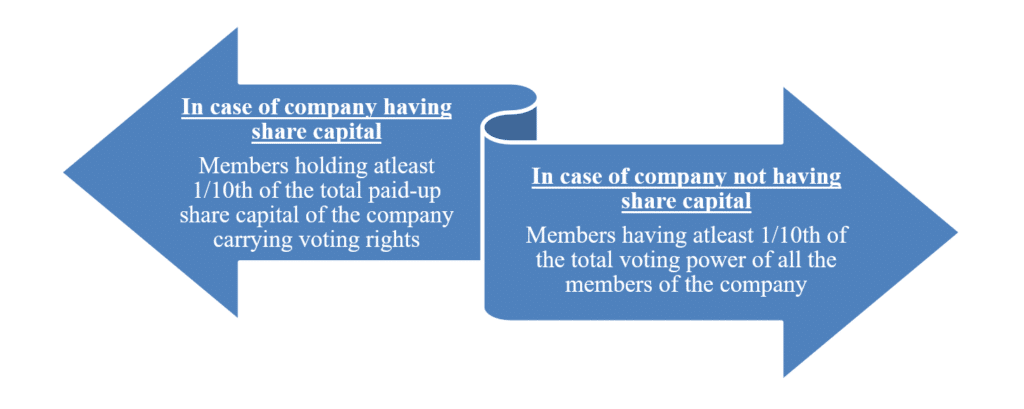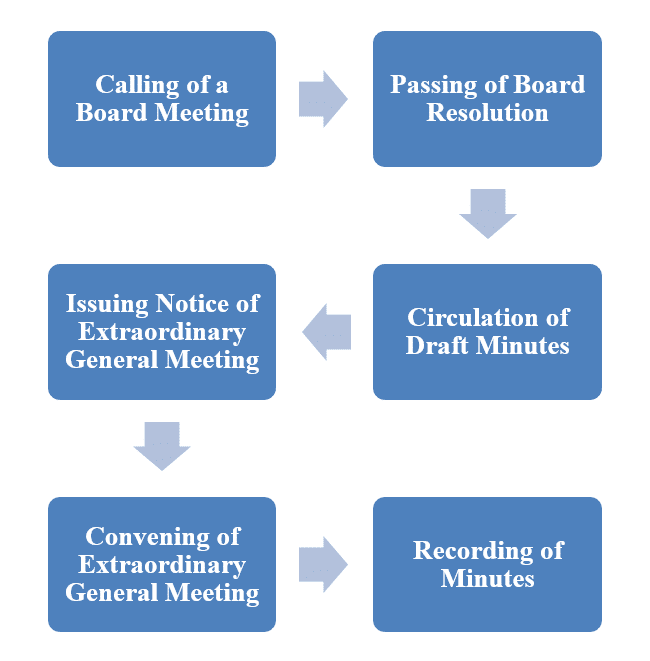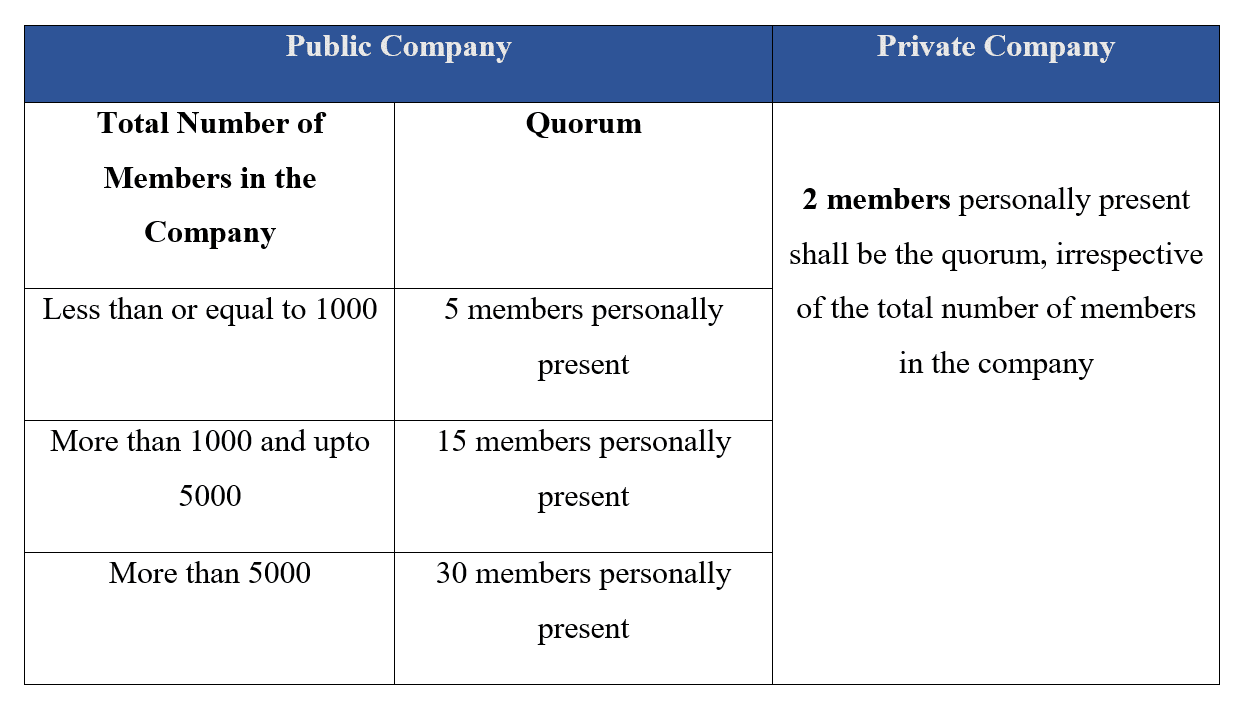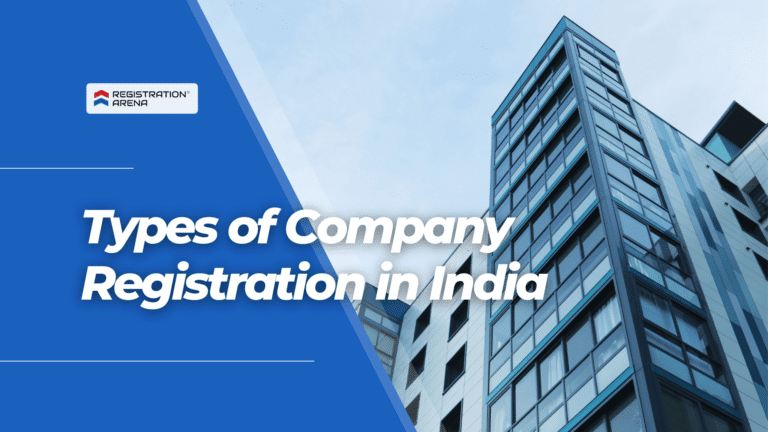Introduction
Extra Ordinary General Meeting can be called by the Board of Directors, members, or a tribunal. When it is called by the Board of Directors upon the requisition of members, it is referred to as an “extraordinary general meeting on requisition of members”.
Companies Act, 2013 contains provisions regarding different types of meetings such as Shareholders Meetings, Directors Meetings, Committee Meetings, etc. Shareholders’ Meetings, also known as General Meetings, can be further classified into three categories: Annual General Meetings, Extraordinary General Meetings (EGM), and Class Meetings.
While it is mandatory for a company to conduct an annual general meeting once a year (except for One Person Company), an EGM can be called anytime when it is necessary to do so and when the matter requires the immediate attention of the members.
Provision under the Companies Act, 2013
Table F of Schedule I
According to Regulation 42, Table F of Schedule I to the Companies Act, 2013, all general meetings other than the annual general meeting shall be called extraordinary general meetings.
Section 100 of the Companies Act, 2013
Section 100(2) of the Companies Act, 2013 contains a provision regarding the EGM of a company on the requisition of members. It provides that if a valid requisition is made by members of a company, the Board of Directors shall call an extraordinary general meeting of the company within a specified period. The requisition shall be made by:

Note: Such shareholding and voting power shall be held by members as of the date of receipt of the requisition by the company.
Other Essentials of a Valid Requisition
● The requisition shall clearly lay down the matters for which the requisitionists want the Board of Directors to call an EGM of the company.
● It shall be signed by the requisitionists.
● It shall be sent to the registered office of the company.
Within how many days should an EGM on Requisition be called by Board?
If the Board of Directors of a company receive a valid requisition from members of the company, then they shall proceed to call an EGM within the next 21 days and the meeting shall be held within 45 days from the date of receipt of such requisition by the company.
Procedure for Conducting Extraordinary General Meeting on Requisition of members
Following is the procedure for conducting an EGM of a company on the requisition of members.

1) Calling of a Board Meeting – In order to conduct an extraordinary general meeting of a company, first call a meeting of the Board of Directors of the company. For calling board meetings, send a notice to all the directors of the company at their respective addresses registered with the company.
Such notice shall be issued at least 7 days prior to the date of the Board Meeting. Also, the agenda and draft resolution shall be attached with the notice.
2) Passing of Board Resolution – In a duly convened meeting of the Board of Directors, pass a resolution fixing date, time, and venue of the extraordinary general meeting to be held. Also, approve the draft notice of the extraordinary general meeting and explanatory statement to be annexed with such notice (if any).
Further, authorize a Director of the Company or Company Secretary for signing and issuing the notice of extraordinary general meeting and for carrying out all such acts as may be required.
3) Circulation of Draft Minutes – Within 15 days from the conclusion of the Board Meeting, circulate draft minutes to all the directors so they can comment on the same.
4) Issuing Notice of Extraordinary General Meeting – The Director or Company Secretary so authorized shall issue the notice of extraordinary general meeting (EGM) at least 21 clear days prior to the date of the proposed meeting.
The notice can be in writing or can be sent through electronic mode or through any other mode as specified by SS-2. However, it shall contain the day, date, time, and place of the meeting, along with an explanatory statement if required, and shall be sent to all the directors, members, and auditors of the company.
Note: An extraordinary general meeting (EGM) can be called on shorter notice as well if consent (in writing/ electronic mode) is received from –
a) members holding 95% of the paid-up share capital of the company carrying voting rights, in case of the company having a share capital
b) members having 95% of the total voting power of the company, in case of the company not having a share capital.
5) Convening of Extraordinary General Meeting – In the presence of a requisite quorum and Chairman of the meeting, conduct the meeting and transact all the matters for which the meeting is conducted and as set out in the notice of the meeting.
6) Recording of Minutes – Minutes of the meeting shall be recorded in the respective minutes’ book within 30 days from the conclusion of the meeting.
The Quorum for Extraordinary General Meeting (EGM)
Section 103 of the Companies Act, 2013 contains a provision regarding quorum for general meetings i.e., the minimum number of members required to be present in person, in order to convene a valid meeting. The following table shows the requisite quorum for general meetings (including extraordinary general meetings) in the case of a public company and a private ltd company –

The total number of members shall be checked as of the date of the meeting in case of a public company. Further, as per Secretarial Standard-2, a quorum shall be present at all times during a meeting.
If an extraordinary general meeting is called by the Board of Directors on the requisition of members and quorum is not present within half an hour of the appointed time, the meeting shall stand adjourned and shall then be conducted in the next week on the same day, place and time.
However, if such a meeting is called by requisitionists themselves and the quorum is not present within half an hour of the appointed time, the meeting shall stand canceled.
Chairman of Extraordinary General Meeting (EGM)
As per Secretarial Standard–2, the Chairman of the Board shall chair the general meetings of the company including an EGM. However, if the Chairman is not present within 15 minutes from the appointed time of the meeting or is unwilling to chair the meeting or if a Director has not been designated for the same, Chairman shall be elected from all the directors who are present at the meeting.
If none of the directors is present or is unwilling to chair the meeting, Chairman shall be elected from the members present at the meeting through a show of hands. In case a poll is demanded for the election of the Chairman of the meeting, it shall be conducted immediately.
Also, until the poll result is announced and a new person is elected as Chairman for the rest of the meeting, the Chairman elected through a show of hands shall continue to chair the meeting.
Special Business
All the businesses that are transacted at an extraordinary general meeting are considered special businesses.
Rules on Extraordinary General Meetings (EGM) under Company Law that must be complied
Rule 17 of the Companies (Management and Administration) Rules, 2014 contains the following provision regarding the extraordinary general meeting of a company on the requisition of members –
● The requisition may be provided by members for the convening of extraordinary general meetings in writing or in electronic mode.
● The requisition shall be provided at least 21 clear days before the date proposed for the extraordinary general meeting.
● The meeting can be convened on any day other than national holiday and during normal business working hours i.e., between 9 am to 6 pm.
● The notice of an extraordinary general meeting of a company on the requisition of members shall be sent to such members only whose names are there in the Register of Members maintained by the company. Such names shall be checked on the 3rd day of receiving a valid requisition from members.
● The meeting shall be conducted at the registered office of the company or in the same city or town in which the registered office of the company is situated.
● If a resolution is required to be passed as a special resolution at an extraordinary general meeting of the company, the notice for the meeting shall be given in accordance with Section 114(2) of the Companies Act, 2013.
In addition, Form MGT-14 shall be filed with the Registrar of Companies, along with the explanatory statement, within 30 days of passing such resolution.
Other Provisions Regarding EGM of a Company
Secretarial Standard – 2 contains the following provision regarding the extraordinary general meeting of a company –
● Notice of an extraordinary general meeting shall be sent by hand delivery or by ordinary post or by registered post or by speed post or by facsimile or by courier or by electronic mail or other electronic modes.
● Such notice shall also be hosted on the website of the company, if any.
● A member who is eligible to attend the extraordinary general meeting and cast a vote, can appoint a proxy on his behalf to attend and vote in the meeting. It is not necessary for such a proxy to be a member of the company.
● For the purpose of determining the quorum for the meeting, proxies shall not be included.
● Voting on a resolution shall be done through the show of hands unless a poll has been demanded or it has been decided to put the resolution for remote e-voting.
What if an Extraordinary General Meeting on Requisition of members is not conducted by the Board?
In case of the Board’s failure to conduct an EGM on the requisition of members, within 45 days from the date of receipt of the valid requisition, the requisitionists themselves may call an extraordinary general meeting of the company within 3 months from the date of such requisition.
In such case, the company shall give the list of members (as of the 21st day of receiving a valid requisition) along with their addresses and shareholding details to requisitionists within 45 days of receiving a valid requisition.
Further, if such a meeting is called, an explanatory statement is not required to be annexed with the notice of the meeting and the notice shall be sent through registered post or speed post or electronic means.
Moreover, all the expenses that are incurred by requisitionists in relation to the conduct of the meeting, shall be reimbursed by the company to such requisitionists and the same shall be deducted from the remuneration of directors in default.








